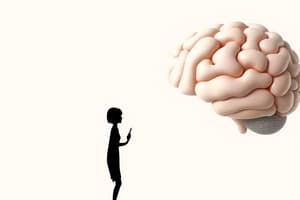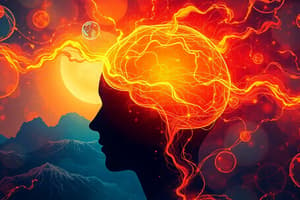Podcast
Questions and Answers
What is psychology?
What is psychology?
- The study of animals
- The scientific study of behavior and mental processes (correct)
- The study of history
- The study of social interactions
What does behavior include?
What does behavior include?
Anything we do that can be measured, including all of our outward actions and reactions.
What are mental processes?
What are mental processes?
All the internal, covert activity of our minds.
List the 4 goals of psychology.
List the 4 goals of psychology.
Why is psychology considered a science?
Why is psychology considered a science?
What does description begin with?
What does description begin with?
What does description involve?
What does description involve?
What is a theory?
What is a theory?
What is prediction in psychology?
What is prediction in psychology?
What does control in psychology refer to?
What does control in psychology refer to?
What does structuralism focus on?
What does structuralism focus on?
Who established the first psychological laboratory?
Who established the first psychological laboratory?
What is objective introspection?
What is objective introspection?
Who was Edward Titchener?
Who was Edward Titchener?
Who is considered the 'father of psychology' and why?
Who is considered the 'father of psychology' and why?
Who believed that experiences could be broken down into individual emotions and sensations?
Who believed that experiences could be broken down into individual emotions and sensations?
Who founded the first psychology lab in the U.S.?
Who founded the first psychology lab in the U.S.?
What is functionalism?
What is functionalism?
What did functionalism influence?
What did functionalism influence?
Whose theories influenced William James?
Whose theories influenced William James?
Who was Mary Whiton Calkins?
Who was Mary Whiton Calkins?
Who was Francis Cecil Sumner?
Who was Francis Cecil Sumner?
What is psychoanalysis?
What is psychoanalysis?
What did patients undergoing psychoanalysis typically suffer from?
What did patients undergoing psychoanalysis typically suffer from?
What did Sigmund Freud propose about the mind?
What did Sigmund Freud propose about the mind?
What is behaviorism?
What is behaviorism?
What did John B. Watson believe about phobias?
What did John B. Watson believe about phobias?
Whose work was behaviorism based on?
Whose work was behaviorism based on?
What did Freud believe about the source of all behavior?
What did Freud believe about the source of all behavior?
What did Watson believe about behavior?
What did Watson believe about behavior?
Name the major modern psychological perspectives.
Name the major modern psychological perspectives.
What does the psychodynamic perspective focus on?
What does the psychodynamic perspective focus on?
What is the behavioral perspective?
What is the behavioral perspective?
What is the humanistic perspective?
What is the humanistic perspective?
What is self-actualization?
What is self-actualization?
What does cognitive psychology focus on?
What does cognitive psychology focus on?
What is cognitive neuroscience?
What is cognitive neuroscience?
What is the sociocultural perspective?
What is the sociocultural perspective?
What does social psychology study?
What does social psychology study?
What is cultural psychology?
What is cultural psychology?
What is the biopsychological perspective?
What is the biopsychological perspective?
What is evolutionary psychology?
What is evolutionary psychology?
What does the evolutionary perspective focus on?
What does the evolutionary perspective focus on?
In evolutionary psychology, how is behavior seen?
In evolutionary psychology, how is behavior seen?
What does positive psychology recommend?
What does positive psychology recommend?
Who is recognized as one of the founders of positive psychology?
Who is recognized as one of the founders of positive psychology?
What are some reasons for psychological research?
What are some reasons for psychological research?
List the 9 major subfields of psychology.
List the 9 major subfields of psychology.
What is clinical psychology?
What is clinical psychology?
What is the difference between psychiatrists and psychologists?
What is the difference between psychiatrists and psychologists?
What is counseling psychology?
What is counseling psychology?
What is developmental psychology?
What is developmental psychology?
What is experimental psychology?
What is experimental psychology?
What is physiological psychology?
What is physiological psychology?
What is personality psychology?
What is personality psychology?
What is comparative psychology?
What is comparative psychology?
What is industrial/organizational (I/O) psychology?
What is industrial/organizational (I/O) psychology?
How does psychology benefit society?
How does psychology benefit society?
What is the scientific method?
What is the scientific method?
List the steps in the scientific method.
List the steps in the scientific method.
What is a hypothesis?
What is a hypothesis?
List the types of descriptive methods.
List the types of descriptive methods.
What is naturalistic observation?
What is naturalistic observation?
What is an advantage of naturalistic observation?
What is an advantage of naturalistic observation?
What are some disadvantages of naturalistic observation?
What are some disadvantages of naturalistic observation?
What is the observer effect?
What is the observer effect?
What is observer bias?
What is observer bias?
What is laboratory observation?
What is laboratory observation?
What is an advantage of laboratory observation?
What is an advantage of laboratory observation?
What is a disadvantage of laboratory observation?
What is a disadvantage of laboratory observation?
What is a case study?
What is a case study?
What is an advantage of a case study?
What is an advantage of a case study?
What are the disadvantages of a case study?
What are the disadvantages of a case study?
What is a famous case study?
What is a famous case study?
What is the survey method?
What is the survey method?
Surveys are given to what kind of sample?
Surveys are given to what kind of sample?
What are the advantages of surveys?
What are the advantages of surveys?
What are the disadvantages of surveys?
What are the disadvantages of surveys?
What does population refer to in surveys?
What does population refer to in surveys?
What are 2 methods that allow researchers to know more than just a description?
What are 2 methods that allow researchers to know more than just a description?
What is a correlation?
What is a correlation?
What is a variable?
What is a variable?
Measures of 2 variables produce a ___________ (r).
Measures of 2 variables produce a ___________ (r).
Knowing the value of one variable allows researchers to predict the value of the other variable.
Knowing the value of one variable allows researchers to predict the value of the other variable.
Correlation proves causation.
Correlation proves causation.
What is an experimental group?
What is an experimental group?
What is a control group?
What is a control group?
What is random assignment?
What is random assignment?
What is an experiment?
What is an experiment?
What is an operational definition?
What is an operational definition?
Parents or guardians of minors must give _____ _____ before participation in research.
Parents or guardians of minors must give _____ _____ before participation in research.
What is an independent variable (IV)?
What is an independent variable (IV)?
What is a dependent variable (DV)?
What is a dependent variable (DV)?
What is the placebo effect?
What is the placebo effect?
What is the experimenter effect?
What is the experimenter effect?
What is a double-blind study?
What is a double-blind study?
What does psychology and animal research do?
What does psychology and animal research do?
Flashcards are hidden until you start studying
Study Notes
Psychology Overview
- Psychology is the scientific study of behavior and mental processes encompassing observable actions and internal cognitive functions.
- Behavior includes all measurable outward actions and reactions, such as talking and facial expressions.
- Mental processes involve internal activities, such as thinking, feeling, and remembering.
Goals of Psychology
- Four primary goals include: description, explanation, prediction, and control of behavior.
Scientific Nature of Psychology
- Observations must be objective to avoid biases; careful measurements are crucial for valid results.
Historical Foundations
- Wilhelm Wundt established the first psychology laboratory in Germany (1879) and advocated for objective introspection.
- Edward Titchener, Wundt's student, introduced structuralism to America, focusing on the mind's basic elements.
Key Figures in Psychology
- G. Stanley Hall founded America's first psychology lab, was the first to earn a Ph.D. in psychology, and the first president of the APA.
- William James proposed functionalism, emphasizing how mental processes help individuals adapt to their environment.
- Mary Whiton Calkins, denied a Ph.D. due to her gender, became the first female APA president.
- Francis Cecil Sumner is recognized as the first African American to earn a Ph.D. in psychology.
Psychoanalysis and Behaviorism
- Sigmund Freud introduced psychoanalysis, suggesting an unconscious mind influences behavior through repressed urges and childhood experiences.
- John B. Watson founded behaviorism, focusing solely on observable behavior and believing all behaviors are learned, as illustrated by the "Little Albert" experiment.
Major Psychological Perspectives
- Six contemporary perspectives include:
- Psychodynamic influences on development and motivations.
- Behavioral studies on reinforcement and operant conditioning by B.F. Skinner.
- Humanistic psychology highlighting potential and self-actualization, founded by Abraham Maslow and Carl Rogers.
- Cognitive psychology examining memory, intelligence, and problem-solving processes.
- Sociocultural perspectives relating behavior to cultural context.
- Biopsychological views correlating behavior to biological events in the body.
Research Methods in Psychology
- The scientific method encompasses generating hypotheses, testing, and reporting results.
- Key descriptive methods:
- Naturalistic observation allows real-world behavior observation without interference.
- Laboratory observation provides environmental control but may yield artificial behavior.
- Case studies offer detailed analysis of individual cases but may include biases.
- Surveys gather data from large groups but rely on representative samples to avoid bias.
Correlation and Experiments
- Correlation measures the relationship between variables; it does not equate to causation.
- Experiments involve manipulation of variables to establish cause-effect relationships.
- Random assignment ensures even distribution of participants between experimental and control groups.
Ethical Considerations
- Informed consent is necessary for participants, particularly minors, before experimental participation.
- Placebo effects and experimenter biases must be minimized through methods like double-blind studies.
Subfields of Psychology
- Includes clinical, counseling, developmental, experimental, social, personality, physiological, comparative, and industrial/organizational psychology.
Social Benefits and Applications
- Research, counseling, and treatment enhance psychological well-being and societal functioning by addressing mental health and behavior issues.
Studying That Suits You
Use AI to generate personalized quizzes and flashcards to suit your learning preferences.




